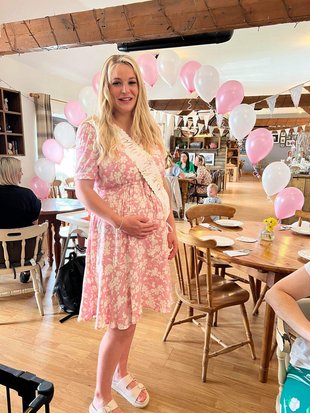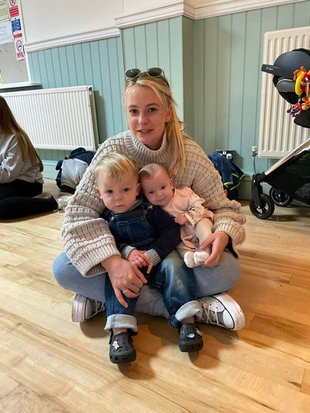Rose: I wish I pushed for answers

Rose at her baby shower.
During Rose’s first pregnancy, cysts were discovered on her ovaries. But despite her family history of cancer, she was reassured that the cysts were harmless. It was not until the birth of her second child that she was sadly diagnosed with ovarian cancer.
Rose reflects on her journey to diagnosis and her symptoms to help other women who may be at risk of the disease.
“During my first pregnancy, I was told in a private early pregnancy scan that I had cysts on my ovaries.
The health professional looked concerned - and I remember feeling very scared. I was then referred to my local hospital for an ultrasound scan, but was reassured the cysts would go away on their own. I did not think much more of them.
During my second pregnancy I was told the same thing by my local hospital – that they weren’t an issue. They said this was because I wasn’t experiencing any pain or fertility issues. As a result, I didn’t feel concerned.
RoseI didn’t have much time to think of myself and spot the symptoms I was having. I was 16 weeks pregnant and was also nursing my Mum through cancer.
Things didn’t go to plan when I went into labour, and I ended up having an emergency caesarean.
The surgeon asked if I had endometriosis due to the tissue growing around my reproductive organs. I’d never had any symptoms of endometriosis and it wasn’t something that had ever come up before.
Three months post-partum, I was sent for an ultrasound scan to review things further and was told that it still didn’t look right. I was referred to a gynaecologist, but unfortunately I didn’t hear anything for another three months.
In this time I contacted a private consultant who sent me for MRI and CT scans. The results concerned them enough to suggest an operation to examine the cysts in more detail. It was explained to me that if they were cancerous then I would need a full hysterectomy. That terrified me.
I had the operation on 22 February 2023 – but it didn’t go as I had expected. When I came round, I learned that they had to perform a full hysterectomy immediately. My consultant then had to go straight into another surgery, so I had to wait four agonising hours to be told exactly what had happened. It was an incredibly difficult and scary time.
RoseMy diagnosis was a real shock, but I just didn’t know what symptoms to look out for at the time.

Rose
I experienced bloating that I thought was a mummy tummy, lower back pain and intermittent constipation. I just hadn’t acknowledged them as anything other than the side effects of having two pregnancies close together.
Looking back, I wish I had paid more attention to myself and pushed for answers about the cysts. They were never really investigated with any seriousness.
I am sure the first radiographer knew what she was looking at hence her reaction. I can’t put my finger on it, but it was more of a feeling that she portrayed. She did her job, but she couldn’t do any more than refer me to my GP.
My body has been through so much in the past two years. Two pregnancies, a caesarean, a hysterectomy and now chemotherapy and medical menopause. It’s been a huge challenge, both physically and mentally.
I’m still coming to terms with my diagnosis, but I try to stay positive and get on with daily life as best as I can. I have now started my course of chemotherapy, which will include six rounds in total.
My children definitely help take my mind off it all and inspire me to keep going. They are now two years old and 10 months old. I’m determined to watch them grow up and be there for them as they get older.
I wish I had known about my risk and had been diagnosed sooner, but I’m grateful I’m still here.”
Ovarian cancer symptoms can be easily missed and attributed to other illnesses. We can save thousands more lives by equipping people with the information that can prevent ovarian cancer in those at highest risk and diagnose ovarian cancer in others as early as possible.